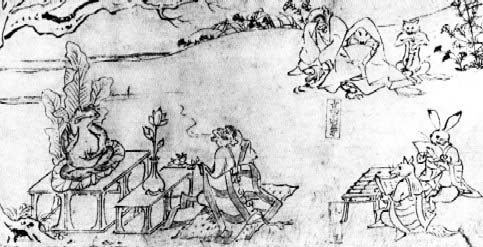In the koan collection called Hekiganroku, Case 70 presents a koan called “Kuei Shan Attends on Pai Chang.” There are four sentences in this koan, each sentence followed by a jakugo, or a penetratingly sagacious Zen comment. One thing I find interesting is the first three Chinese characters of the first jakugo: 阿呵呵, meaning Ah-ha-ha!
These three characters are fun to look at because they contain the Chinese character for mouth (kǒu 口) five times over, once in the first character, and twice each in the second and third characters — count them.
Laughter and laughing Zen monks are prevalent throughout Zen literature and art and this got me to wondering about the frequency of occurrence of 阿呵呵 or Ah-ha-ha! in the traditional canon of writings. A search in CBReader for 阿呵呵 revealed that the phrase occurs 525 times. That’s a lot of laughter, lots of fun!

Here’s the Chinese text of the koan with the jakugos enclosed in parentheses:
【七十】舉。溈山五峯雲巖。同侍立百丈(阿呵呵。終始誵訛。君向西秦我之東魯)百丈問溈山。併却咽喉唇吻。作麼生道(一將難求)溈山云。却請和尚道(借路經過)丈云。我不辭向汝道。恐已後喪我兒孫(不免老婆心切。面皮厚三寸。和泥合水。就身打劫)
Of the many ingenuities in the Zen tradition, one of the most subtle is the koan (Chi. kung-an [公案], pronounced in Japanese as two syllables: ko-an). A koan is a Zen “problem” or a Zen “story” or a theme of zazen to be made clear, and may be thought of as an ideal of bafflement.
As Steven Heine says, the koan is “Zen’s main religious symbol,”1 and Dale Wright observes that “koan meditation may be the most condensed and self-conscious linguistic practice ever devised in any culture.”2
Heinrich Dumoulin points out the Chinese origin: “The use of koans in Zen Buddhism is a unique phenomenon in the history of religion; nothing like it exists in other religious traditions. Developed in China, koans testify to an authentically Chinese mentality, particularly in the way they are rooted in real life. If Zen can be called the Chinese expression of Buddhism, then koans are the most Chinese dimension of Zen.”
阿呵呵 . . . Ah-ha-ha!
Notes
1. Steven Heine, Dogen and the Koan Tradition, p. 87
2. Dale Wright, Philosophical Meditations on Zen Buddhism, p. 81
HyC